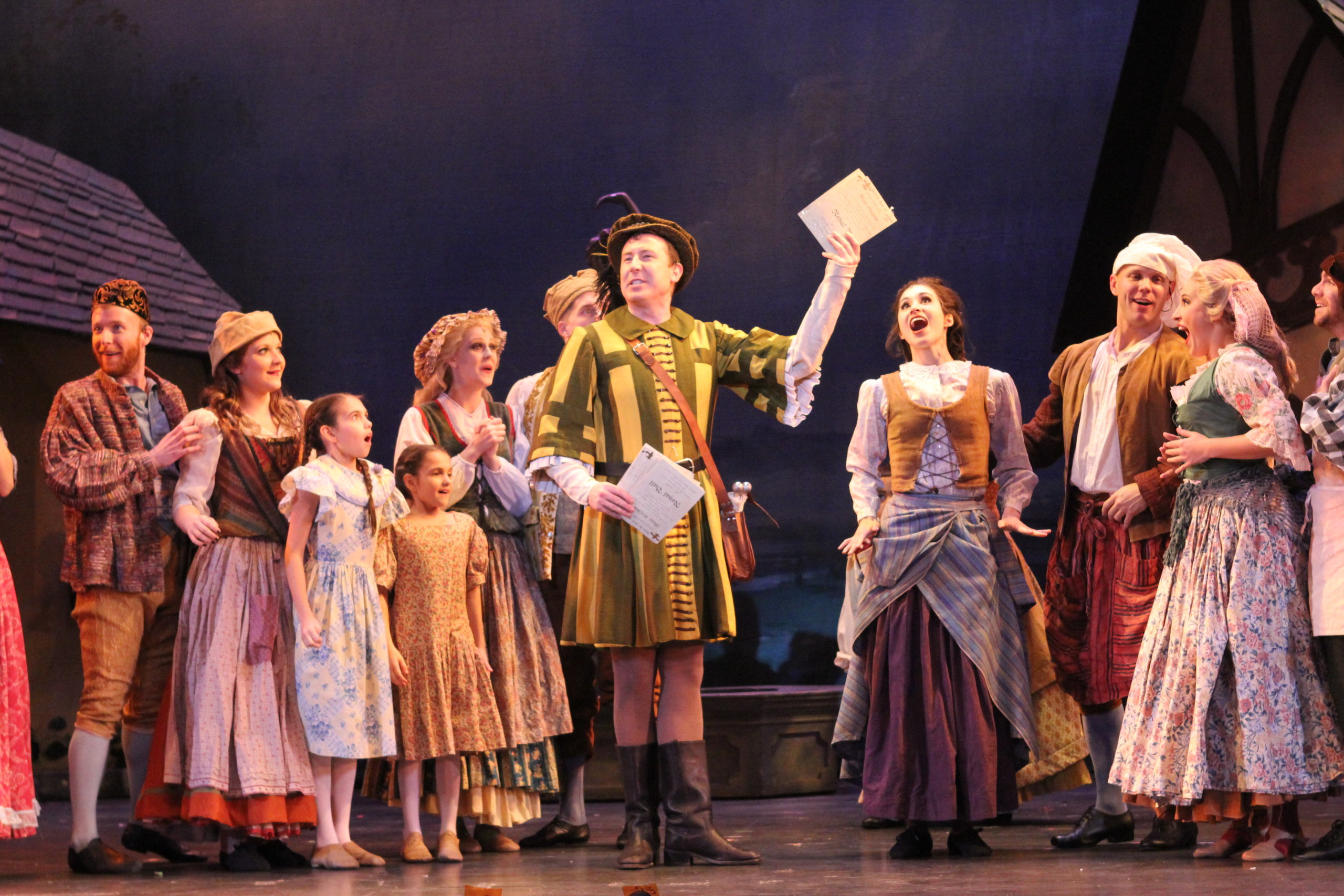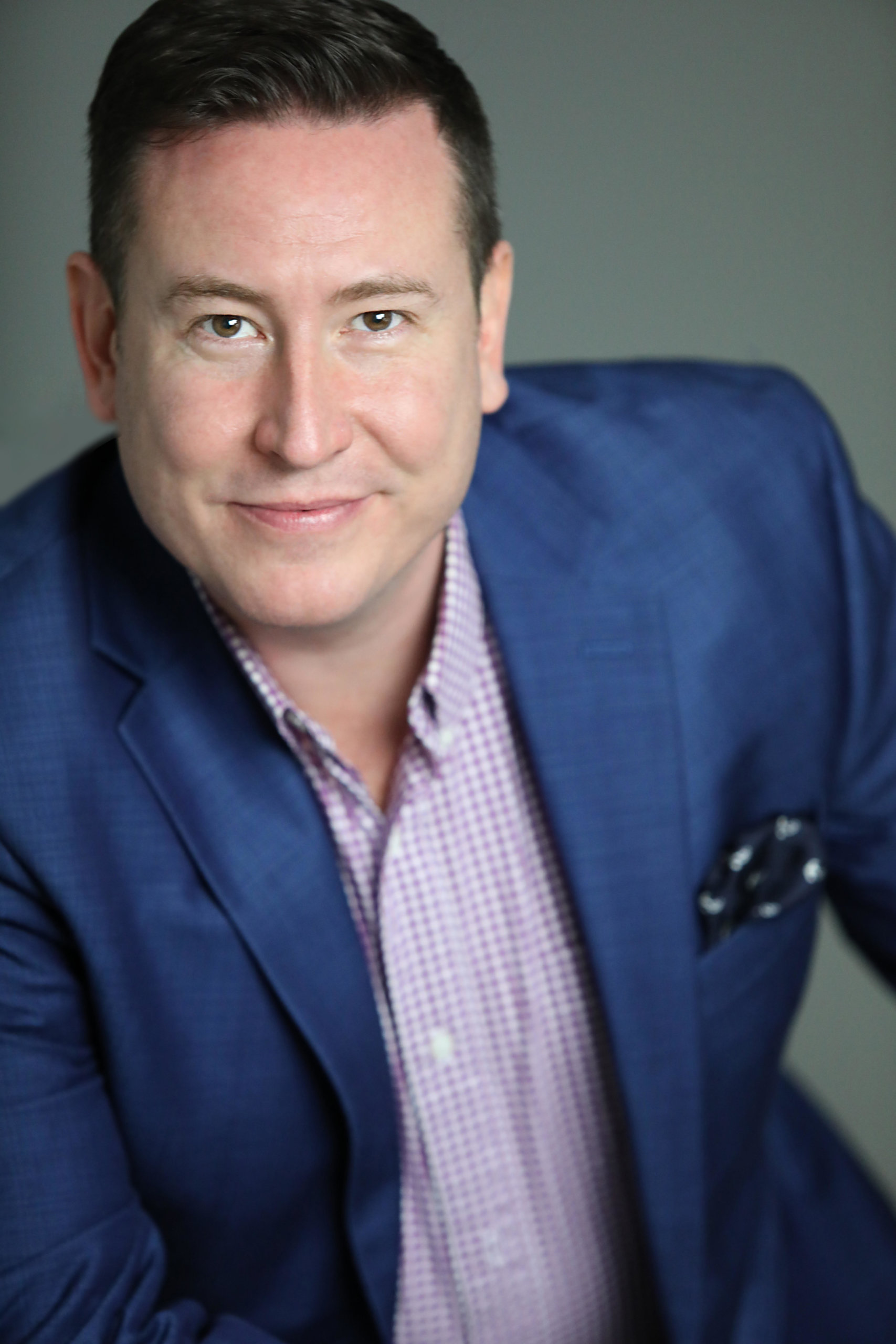Scot Patrick Allan of The Gateway: The Friendly Face of a Safe Haven

Anyone who has seen a show at The Gateway Playhouse in Bellport has likely been introduced to the charming Scot Patrick Allan, either during the show’s introduction on opening night or in the production as a member of the cast. Considered to be the face of The Gateway in addition to its director of development and public relations, Allan has come a long way since his acting career first led him to perform on the playhouse stage in a 2005 production of Evita.
Raised in intercity Boston, Allan grew up streetwise and grateful for his supportive family. His artistic endeavors brought him to the London Academy of Music and Dramatic Art and then to Shenandoah University for a degree in musical theater. Throughout his acting career, he spent time on the road for the first U.S. national Broadway tour of Grease and performed in other productions including five or so on The Gateway’s stage.
“Ever since I was a young performer here, it’s definitely been a safe haven,” Allan says. “I know that my boss who grew up here used to say that even in the ’70s and ’80s before being LGBTQIA+ was cool — because now it’s kind of a cool thing — it was a safe place for the ‘misfit toys.’ Anybody can be who they want to be here; it’s like a safe little oasis, especially behind the scenes.”
As he developed relationships with The Gateway team, he began seeking out more ways to get involved, and by 2011 he was a full-fledged part of the team. Even as director of development and public relations, Allan has been able to flex his acting chops in The Gateway’s productions of White Christmas, Shrek the Musical, Rodgers and Hammerstein’s Cinderella and, most recently, last holiday’s A Christmas Carol. One of his biggest contributions to the performing arts center was helping to guide its transition from a small business to a nonprofit, which has allowed it to better integrate into the community and provide tax benefits to its loyal supporters.
Allan was kind enough to chat with us further about his time at The Gateway.
How has your role at The Gateway evolved over the years?
I became friendly with the casting director and the producers here, and I kind of worked my up to an assistant director position, dance captain position, assistant casting director where I was helping them run auditions in the city, so I got to know the producing team. There was a point in my life when, as any young person in any career feels, I kind of wanted to go back to grad school and learn a new trade. I really didn’t want to go to school though, so I took a position here in the producing office to learn that side of it and also to help the theater transition into a nonprofit, help them solicit sponsors and fundraising. That’s kind of what I’ve been doing for the past 10 years now. Right now, I handle the fundraising and I handle the entire marketing budget, the press and the media. …
I wear a lot of hats; we all do. Anyone in the nonprofit business wears a lot of hats. It’s hard to stay in your lane when you’re dealing with what we do, so there’s a lot of overlap between departments and responsibilities. When I first came on in an administrative level, I was basically the producer’s assistant, helping him to do all the things that he does. I kind of absorbed the advertising and marketing strategy from that department, and then I created my own fundraising-sponsorship-solicitation department, because we are a nonprofit now. We were never able to create that before. I carved a little bit of a niche for myself and made myself financially viable to the company, that’s for sure.
How have you been able to incorporate your passion for acting into your director role?
It’s creative every day, and we’re always working on new projects. … We’re constantly working on a brand new show, new children’s theater show, mainstage Broadway show, concert or gala. We have to have a new approach to every single show because it’s a different audience, different creative aspects, different ways to market it, and every single show is different. I wouldn’t be able to do what I do if I hadn’t had my Broadway and New York City theater training and my degree in theater — I wouldn’t have the eye to know what is right. I think it kind of all stacks on each other: There’s no way I could do what I do now without what I’ve done before. …
It’s a lot of work. It’s really splitting my time and pulling me from my other responsibilities, but it is also fun. I am musical in a bunch of roles, and if there’s ever a role that’s kind of perfect for me and I’d be into that, it’s just a fun thing to do.
In what ways have you helped to bolster The Gateway’s support of the LGBTQ community?
I’m going to be honest, I don’t think it needs a lot of help. Like I said, back in the day, it was just a safe haven. Musical theater has always been a little bit of a safe space for people of a different orientation, and it was no different back in the ’70s and ’80s. The team here is very all-inclusive, and I think that just being the face of the company and being gay, that helps. Especially in our area, there aren’t too many people in power in our community that are gay. Certainly in Bellport Village, though in Southampton it may be different. I think that just being a leader and being a vocal face without apology of who you are, is important. I’ll be honest with you, people say, ‘Oh, you work in the musical theater, everyone you work with must be gay.’ And I’m like, ‘No, I’m the only one on the management team, ha.’ Which is very ironic, to have a fully staffed, full-time anyway, team where there’s not as many as you’d think. There’s plenty of LGBTQIA+ people that work here with the actors, the crew and choreographers.
It’s just a safe space for them, especially because people are living here. You know, we still have the full-time employees, and we house up to 80 people at a time on the property. When people are living on top of each other, they have to really feel comfortable with each other. And I think that The Gateway, from the top down, really makes that a priority where we’re very worried about pronouns, very worried about healthcare, very worried about what our people need, especially since people come from all over the country to work here. This is really all they know in the area — these little five acres.
It’s mostly the cast and crew of the current show, but a few full-time employees live on the property, like the company management, which have to be available at all times, but certainly upper management lives in their own places. Anyone you see onstage, and any crew you see, or don’t see, walking around, they all live here. … We’re really the only professional theater on Long Island that houses all their actors, which is a perk. It’s comfortable; we have nice grounds, a nice pool, a barbecue, a volleyball net. It’s lovely; people like being here. It’s a respite.
What do you find most exciting or rewarding about the work you do at The Gateway?
We’re not afraid of risky titles. We did Head Over Heels last year, which had a real message of inclusiveness and finding people’s pronouns and true selves in their sexualities, and we do shows like that and Priscilla, Queen of the Desert and Kinky Boots. And Kinky Boots really gives it to you — really gives the awareness of the LGBTQIA+ community to the audience, and I think it’s no shock to say that a lot of people in Patchogue, Bellport and South Shore Long Island don’t see it enough. It’s not presented to them enough, and a lot of the people probably aren’t homophobic, they just don’t know many gay people. They haven’t seen much content. I think things are changing in television media, for sure, and there are so many more than there ever have been, but it still needs to grow. It’s just about sharing our community with them and having it be accepted. So many people walk out of those shows, and they might not have met a gay person in their life, but they know what something means now. We can do that through entertainment. …
We’ve done many, many shows with LGBTQIA+ themes. And unfortunately, we do get kickback from some people who have hate in their heart, and we just don’t care. We don’t care about them, and we need to move forward. We get homophobic complaints about the gay agenda and all that, and it’s like, this is art, man. Art has an agenda, that’s for sure. It’s not a gay agenda, it’s an artistic agenda.
In what ways have you personally been involved in LGBTQ community on Long Island?
One thing that was really hard was, I was on the Patchogue Chamber [of Commerce] board when the Alive After Five first had an LGBTQIA+ Pride theme, and we received hate mail. There was a lot of troubleshooting that had to go into that, and I was definitely a part of the conversation. …
It’s too bad that gay bars don’t exist on Long Island anymore, because of all these apps and things like that. People don’t need to go out and meet each other anymore. I do miss those times. … I’m not afraid to say that it’s a different culture. There are different cultures all over the world, different kinds of people and races, and the gay community is a culture that I’m proud to be a part of, and I like being a part of it. I love Britney Spears, and I tell my friends that I’m a teenage girl at heart. I just bought tickets to Madonna and Janet Jackson, and I’m excited about it.
To learn more about The Gateway and this season’s upcoming shows, visit thegateway.org.



